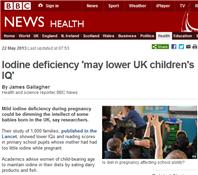Imagine my shock, not at the science/medicine/health, not only that it was in the media, but that it was even on the headlines of the Today program on Radio 4!
Seems there is a Lancet article.
2 May 2013 Last updated at 07:53
Iodine deficiency 'may lower UK children's IQ'
By James Gallagher Health and science reporter, BBC News
Mild iodine deficiency during pregnancy could be dimming the intellect of some babies born in the UK, say researchers.
Their study of 1,000 families, published in the Lancet, showed lower IQs and reading scores in primary school pupils whose mother had had too little iodine while pregnant.
Academics advise women of child-bearing age to maintain iodine in their diets by eating dairy products and fish.
Women were warned not to take seaweed pills, as they contain too much iodine.
Iodine is essential for the development of the brain as it is needed to build some of the body's hormones. A severe deficiency is the leading cause of preventable brain damage in the world.
It was mainly thought of as a problem in developing countries, yet previous studies have also suggested that some women in the UK are mildly deficient. The impact of low-level deficiency was, however, previously unknown.
Common
Researchers at Surrey and Bristol Universities looked at iodine levels in urine samples taken from pregnant women in south-west England.
"It's very well known that iodine deficiency can lead to impaired brain development in areas of severe iodine deficiency," the lead researcher told BBC Radio 4's Today programme.
Prof Margaret Rayman said: "What's novel about our study is that we've carried this out in an area where the deficiency is much less."
The study showed that iodine deficiency was common - affecting two-thirds of women.
Their children went on to have slightly lower IQs at the age of eight and worse reading ability aged nine.
Dr Sarah Bath told the BBC: "We saw a three-point IQ difference between children who were born to mothers with low iodine in early pregnancy and children who were born to mothers above the cut-off."
The researchers said this "may prevent a child reaching their full potential" and was an "important public health issue".
Their advice, published on the British Dietetic Association website, recommends that pregnant and breastfeeding women need 250 micrograms per day and other adults need 150mcg.
<Table of Iodine Content omitted because it would be unreadable - see and follow link at end>
Prof Rayman said: "Our advice is to make sure they have enough iodine intake, and take additional iodine in safely, probably from food - dairy products, fish."
But she pointed out that iodine levels in organic milk are 42% lower than in regular milk, adding that if pregnant women are drinking organic milk, "they need to drink more of it".
Dr Bath warned against using kelp or seaweed supplements, as they are packed with so much iodine it could cause problems.
A large number of pregnancies are unplanned, so the advice is to all women of child-bearing age.
Salt
It had been thought that the UK had dealt with its iodine problem decades ago by "lucky accident". Changes to dairy farming meant cows' milk contained more iodine and at the same time the government was encouraging people to drink more milk.
Other countries - including the US, Denmark and the Netherlands - added iodine to salt so that bread and processed foods became a major source of iodine.
However, the researchers argue it is too soon for the UK to consider a similar measure, as iodine deficiency across the country has yet to be assessed.
Dr Mark Vanderpump, a consultant physician at the Royal Free Hampstead NHS Trust, argues in favour of adding iodine to salt.
However, he said this would provoke fierce debate similar to arguments about adding fluoride to water in order to protect teeth.
In the meantime, he warned pregnant women against suddenly starting to take supplements.
"If you take a supplement during pregnancy, the thyroid gets stunned and goes down. Taking a supplement during pregnancy may not be the best thing to do."
A Department of Health representative said a healthy balanced diet should be enough for women but: "We keep track of emerging research, such as today's report.
"The Scientific Advisory Committee on Nutrition is currently considering the issue of iodine deficiency in the UK. There are currently no plans for fortification of salt with iodine."
bbc.co.uk/news/health-22607161
They specifically said that seaweed products have TOO MUCH IODINE and could be problematic.
Rod

